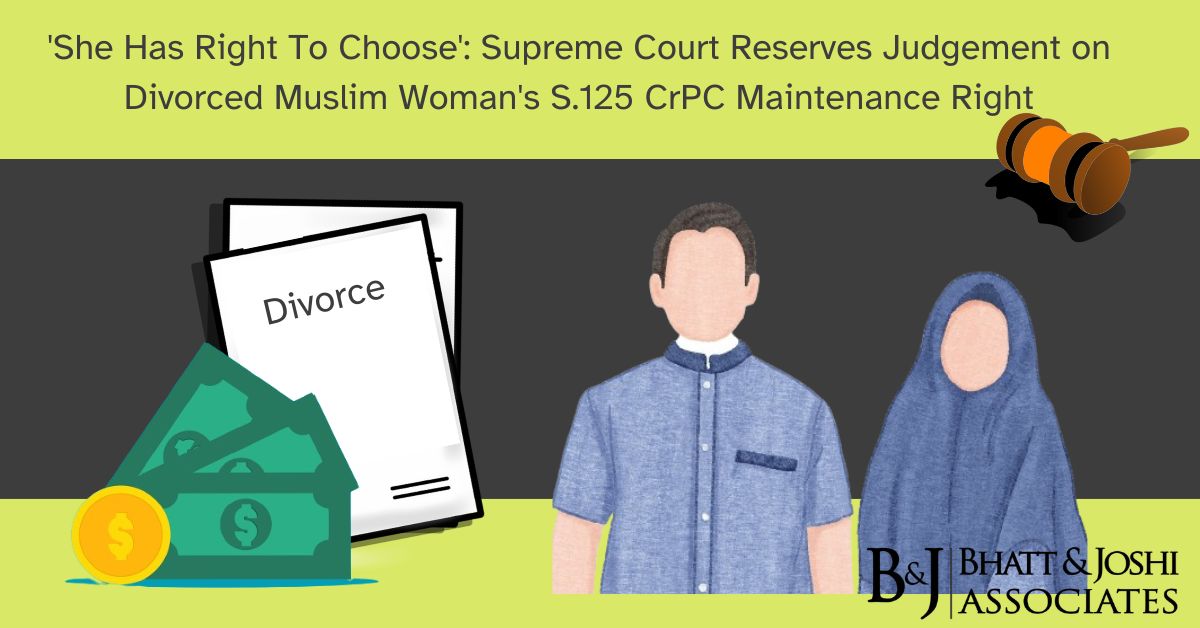Maintenance under Section 125: Supreme Court Reserves Judgment on Divorced Muslim Woman’s Right
Introduction
On February 19, the Supreme Court reserved its judgment in the case of Mohd Abdul Samad v. The State of Telangana & Anr., a significant legal battle raising the question of whether a divorced Muslim woman is entitled to file a petition for maintenance under Section 125 of the Criminal Procedure Code (CrPC). The case has been closely followed as it addresses the interplay between the Muslim Women (Protection of Rights on Divorce) Act, 1986, and the general provisions of Section 125 CrPC.
Background
The bench, comprising Justices BV Nagarathna and Augustine George Masih, heard the plea of a Muslim man challenging the direction to pay interim maintenance to his divorced wife. Senior Advocate Gaurav Agarwal was appointed as Amicus Curiae to assist the court in understanding the complexities surrounding the case.
Contentions Raised on Maintenance Rights under Section 125
The petitioner’s counsel, Senior Advocate S Wasim A Qadri, presented several key arguments:
- The Muslim Women (Protection of Rights on Divorce) Act, 1986, is a comprehensive legislation that goes beyond Section 125 CrPC, providing for mehr, dower, and return of property. It offers a reasonable and fair provision for the divorced woman’s entire life, a feature not found in Section 125 CrPC.
- Referring to the legal position set by the Mohd Ahmed Khan v. Shah Bano Begum case, the Act was enacted to codify the Supreme Court judgment. The Act, being a special law, prevails over the general law (CrPC). The petitioner argued that a divorced Muslim woman, if she has sufficient means, cannot file for maintenance under Section 125 CrPC, whereas, the Act allows deserted or neglected Muslim women to resort to Section 125 CrPC.
- Section 5 of the Act gives an option for the divorced couple not to be governed by the Act, indicating that a Muslim wife cannot resort to both remedies.
- Section 7 of the Act, according to the petitioner, mandates that Section 125 CrPC petitions pending at the Act’s commencement should be disposed of by the Magistrate in terms of Section 3 of the Act.
- The doctrine of implied repeal was invoked, stating that the Act, being a special law, prevails over Section 125 CrPC.
On the other hand, the Amicus Curiae, Senior Advocate Gaurav Agarwal, countered these arguments:
- The Act concretizes Muslim personal law, broadening a divorced Muslim woman’s entitlement to maintenance beyond the iddat period without removing the relief available under Section 125 CrPC.
- Section 5 of the Act is irrelevant to the present case, as it applies when an application is filed under Section 3 of the Act, not Section 125 CrPC.
- Section 7 of the Act is a transitional provision, and it does not bar divorced Muslim women from filing Section 125 CrPC petitions.
- Referring to the Danial Latifi & Anr v. Union Of India case, the Amicus argued that though the Act’s validity was upheld, the Supreme Court questioned how it could deprive Muslim divorced women of the same right available to other women.
- Section 127(3)(b) CrPC allows a husband to avoid liability for maintenance under Section 125 CrPC if provisions have been made under personal law.
- Clarity on the issue is necessary, as different High Courts have taken varying views.
Court Observations
The bench observed that Section 3 of the Act starts with a non-obstante clause, indicating that it is not derogatory to Section 125 CrPC but provides an additional remedy. The judges emphasized that the Act does not bar the filing of Section 125 CrPC petitions, and the choice of remedy lies with the petitioner. They questioned the constitutionality of restricting Section 125 CrPC based on the provisions of the Act.
Conclusion: Clarifying Maintenance Rights under Section 125 CrPC
The case of Mohd Abdul Samad v. The State of Telangana & Anr. holds immense significance in clarifying the legal rights of divorced Muslim women concerning maintenance under Section 125 CrPC and the Muslim Women (Protection of Rights on Divorce) Act, 1986. The reserved judgment is awaited eagerly, as it has the potential to set precedent and guide future legal interpretations in matters involving the intersection of personal and general laws.
 Whatsapp
Whatsapp


